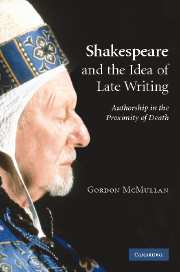Book contents
- Frontmatter
- Contents
- Acknowledgements
- Introduction
- 1 Shakespeare and the idea of late writing: authorship in the proximity of death
- 2 The Shakespearean caesura: genre, chronology, style
- 3 The invention of late Shakespeare: subjectivism and its discontents
- 4 Last words/late plays: the possibility and impossibility of late Shakespeare in early modern culture and theatre
- 5 How old is ‘late’? Late Shakespeare, old age, King Lear
- 6 The Tempest and the uses of late Shakespeare in the theatre: Gielgud, Rylance, Prospero
- Notes
- Index
4 - Last words/late plays: the possibility and impossibility of late Shakespeare in early modern culture and theatre
Published online by Cambridge University Press: 22 September 2009
- Frontmatter
- Contents
- Acknowledgements
- Introduction
- 1 Shakespeare and the idea of late writing: authorship in the proximity of death
- 2 The Shakespearean caesura: genre, chronology, style
- 3 The invention of late Shakespeare: subjectivism and its discontents
- 4 Last words/late plays: the possibility and impossibility of late Shakespeare in early modern culture and theatre
- 5 How old is ‘late’? Late Shakespeare, old age, King Lear
- 6 The Tempest and the uses of late Shakespeare in the theatre: Gielgud, Rylance, Prospero
- Notes
- Index
Summary
Dying men's wordes are ever remarkable.
La poésie doit être faite par tous. Non par un.
I have stated that the idea of late Shakespeare could not, to all intents and purposes, predate Malone's chronology and the subsequent construction of the figure of Shakespeare the author. I have therefore implied that Shakespeare himself could have had no concept of late style and I wish now to explain and qualify this implication in two ways, first of all by considering the significance accorded to the endings of lives – and specifically to last words – in early modern England and then by examining the asymmetrical relationship between the conditions of production in the early modern theatre and those required for the attribution of a late style. I have also begun to argue for another asymmetry, that of, on the one hand, the general idea of late style and, on the other, the specific idea of late Shakespeare, even while claiming that the latter forms a significant constituent part of the former. Late style is a redemptive fantasy of rejuvenation, a manifestation of critical and artistic wish-fulfilment that may at times approximate a biographical truth but which is far more often the product either of the imposition of an understanding of the creative process inimical to the actual conditions in which the art-works in question were produced or of complicity on the part of the artist, consciously producing work that fulfils the criteria for the attribution of a late style.
- Type
- Chapter
- Information
- Shakespeare and the Idea of Late WritingAuthorship in the Proximity of Death, pp. 190 - 258Publisher: Cambridge University PressPrint publication year: 2007



